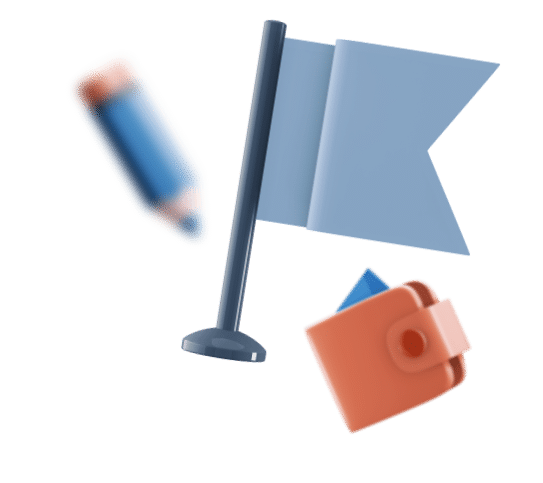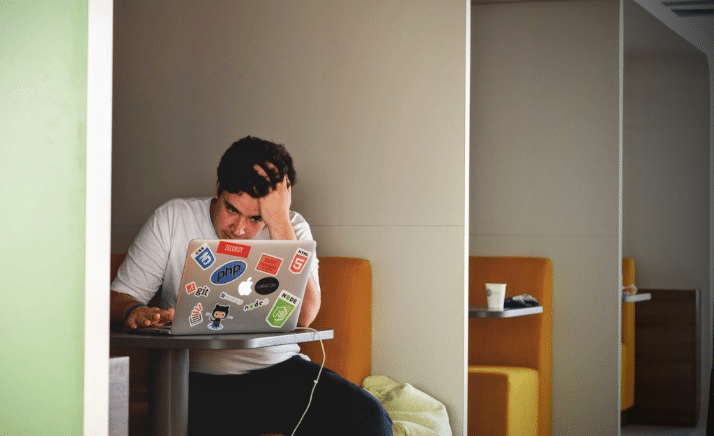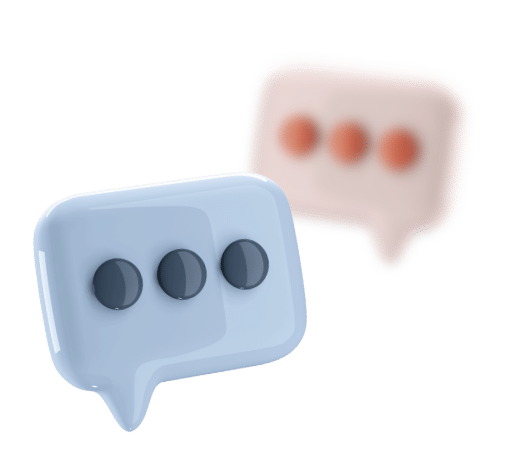College mental health
How to manage student stress and recognize mental health challenges

Contents
01.
Challenges at college

Has your studying moved online because of COVID-19? Are you looking to study courses that offer remote learning? The digital classroom is a great place to learn. Interest has shot up recently because of the pandemic, but it’s always offered students a greater level of flexibility.
However, you do have to learn how to prioritize your studying. In this guide, as well as looking at which colleges offer online learning, we explore the importance of a good working environment and how to embrace the right learning style at home.
College is an exciting time, with plenty of new experiences, but it can also be intimidating. You have more freedom, but you also have more of the responsibilities that arise with adulthood to balance with continuing your education.

Studying
Most colleges offer four-year programs, which result in a bachelor’s degree if you graduate. You don’t have to declare your major straight away, which gives you time to decide what you want to specialize in and opens up multiple paths of study. Focusing on subjects you’re genuinely interested in will make this decision easier.
You can also change your major if you discover a new interest along the way. The earlier this is done, the more likely it is that you can still graduate within four years.
Choosing a subject that interests you will make it easier to find the motivation to study. As well as contact hours with a professor, you’ll have work to complete outside of class (normally two-three hours per hour spent in class), including reviewing notes, writing assignments and background reading. You may also wish to see your professor during their office hours for extra guidance.
Your college may split the academic year into four 10-week terms (the quarter system), with finals at the end of each one. Most colleges use the semester system, where there are two 15-week terms with finals at the end of each one. In both systems, you’ll sit midterms to assess your progress throughout the class.

Learning life skills
Many freshmen will be living away from home for the first time. Lots of colleges have on-campus dorms and housing, which act as a stepping stone between leaving the family home and renting a room off-campus. Some colleges require all freshmen to live on campus, so check the accommodation policy carefully.
This freedom is exciting, but gaining independence can also be daunting.
You are responsible for:
Managing your own time
Creating and sticking to a budget, and paying bills on time
Solving problems
Making decisions
Learning and using domestic skills, such as cooking
Cultivating friendships and relationships with others
Employment
(if you decide to get a job to fund your college experience)
Many students live with a roommate, at least for the first year, which presents its own set of challenges as you learn to co-exist. You’ll meet a lot of people at college, many of them with different opinions and backgrounds to your own.

Social life
The social scenes at college can vary enormously. Sport often has a huge influence over social activities, partly because teams bring people from different courses together, and partly because of school spirit.
However, there are lots of different groups outside of sports teams and they’re a great way to meet like-minded people and make friends. Putting yourself out there can be scary at first, but social activities can be a great stress-reliever.
Some schools are fraternity and sorority-based, but not all. House parties are more common than nights out to bars and clubs, due to the drinking age of 21.
18-22 students drank alcohol in the past month
Admitted to binge drinking during that same period
That said, drinking is still often seen as part of the college experience. When surveyed, nearly 53% of full-time college students between the ages of 18 and 22 said they drank alcohol in the past month. 33% admitted to binge drinking during that same period, with binge drinking defined as five or more drinks for males and four or more drinks for females.
While experimentation is considered part of coming of age, alcohol consumption can cause problems, whether it’s peer pressure to drink more than you’d like to, or the aftereffects impacting academic performance. In more serious cases, excessive drinking can lead to alcohol overdose, accidents, and death.

Feeling overwhelmed
Perhaps it’s an understatement to say that a lot happens while you’re at college. So it’s no surprise that most students feel overwhelmed at one point or another.
In fact, 85% of college students surveyed said they felt overwhelmed by everything they had to do at some point during the academic year, so you’re not alone.
A big factor is the amount of unscheduled time you suddenly have. Most new college students are used to following a very structured high school timetable, so having odd periods of free time between classes can make time management tricky.
It’s tempting to procrastinate, but remember you’ve got to study outside of class, work on assignments, attend extracurricular activities, socialize, exercise, eat and sleep.

Feeling homesick
Being away from home is exciting. But it’s a huge adjustment, and homesickness is not uncommon. It’s understandable to miss family, friends and pets when you’re not used to being away from them.
Plus our brains like certainty, which can be created by having a routine, so it’s natural to feel unsettled when yours is out of sync. Getting into a new routine at college can help alleviate this stress. The brain stores routines in the basal ganglia (i.e. your habit center), which allows the prefrontal cortex – the part of your brain that controls planning, abstract thinking, social intuition and emotional control – to think more clearly and make better decisions.
In short: routines free us up to focus on what’s most important.
If you’re struggling, reach out to on-campus counseling services. We’ll discuss these in more depth in chapter three.
02.
What is stress?

There is no medical definition of stress, although most would agree it’s the body’s response to certain events. We can all recall times when we’ve experienced stress.
Stress can be caused by big changes, both positive and negative – such as those you’ll face when you start college, or throughout your time there. For example, you might feel stressed when you’re about to take an exam.
At other times, it’s more difficult to pinpoint one cause of stress. It can be triggered by:
Being too busy, or not being busy enough
Being under pressure
Feeling like a situation is out of your control
Feeling overwhelmed
Feeling uncertain
Worrying about something
Stress is a normal part of life and can even be motivating in manageable amounts. At other times stress can be overwhelming, and this is when it begins to cause problems.
Signs you might be stressed
| Feelings | Behaviors | Physical signs |
| Anxious/afraid | Avoiding the cause of stress | Blurred eyesight |
| Depressed | Being tearful | Chest pains |
| Irritable | Biting your nails | Constipation or diarrhea |
| Like your thoughts are racing | Constant worrying | Dizziness, nausea or fainting |
| Like you can’t laugh at things you used to | Finding it hard to make decisions | Grinding your teeth or clenching your jaw |
| Lonely or neglected | Overeating, or not eating enough | Headaches |
| Overwhelmed | Picking at your skin | High blood pressure |
| Sense of dread | Restlessness | Indigestion or heartburn |
| Unable to switch off | Smoking or drinking alcohol more than usual | Muscle tension |
| Uninterested or unable to enjoy things you used to | Snapping at people | Panic attacks |
| Worried about your health | Unable to focus | Sexual problems |
| Shallow breathing or hyperventilating | ||
| Sleep problems or being tired all the time |
Source: Mind
Physical signs often appear first. This is because the body releases the hormones cortisol and adrenaline when we’re anxious. We need these hormones, as they let us know when we’re in danger, prompting a fight, flight or freeze response.
During fight-or-flight, your body is preparing to fight or to run, so your heart rate speeds up to increase oxygen flow to the muscles. During freeze, your body stays still to get ready to act at the first sign of trouble. Your pupils will widen to let in more light, your hearing will sharpen, and you may get goosebumps. These responses allow us to protect ourselves quickly.
Problems arise when you’re not in danger but your body thinks you are, because you can’t turn fight, flight or freeze on and off at will. Your body needs cortisol in order to function, but in high levels it can cause a number of symptoms, including:
Blood sugar imbalances
Decreased bone density
Decreased muscle tissue
Higher blood pressure
Impaired cognitive performance
Increased abdominal fat
Lowered immunity and inflammatory responses in the body
Slowed wound healing
Suppressed thyroid function
Source: Very Well Mind
You can manage the effects of stress by learning some coping strategies. Practicing these will benefit your physical and mental health, as well as your academic performance.

Coping with stress
Different coping strategies work for different people, but there are some ways you can start to address stress in your life.
Identify what’s stressing you out
Knowing the cause of your worry is an important step – if you know what the problem is, you can start figuring out ways to tackle it. You can also anticipate stressful situations and prepare for them.
Your stress could be caused by:
A regular issue, such as a particular class at college
Ongoing events, such as family problems
A one-off event, such as arranging a move to new accommodation
Identify what you can control
There might be some practical ways you can take charge of your stressors. For example, if you’re struggling with one of your classes, you can arrange to speak with the professor and get some extra guidance. And if you’re overwhelmed by your workload, you can look at how to organize your time.
Organizing your time
Learning effective time management is a big part of the college experience, and it’s useful well beyond graduation.
Make a list of everything you need to do, then order it from highest priority to lowest.
This will help you see what’s important and what can be tackled later – you don’t want to try to do too many things at once. According to Psychology Today, lists can help to clear your head and foster a sense of purpose.
Break your tasks down into smaller steps
They will feel less daunting and you’ll get a boost from the sense of achievement as you tick each one off. They’ll also give you a clearer path for completing the whole task.
If you can, do your most important tasks at the time when you feel most productive
Are you a morning person, or a night owl? Perhaps you’re in between. Figure this out and you can use it to your advantage.
Take regular breaks
It might seem counterintuitive when you’ve got a lot on your plate, but breaks will give your mind a chance to relax, which will boost your productivity in the long run.

Accept what you can’t control
So much of life is outside of our control. That can be frustrating – but there’s nothing we can do about it. And strangely, accepting this can help, as it allows you to focus your time and energy on the things you can control.
Look after yourself – and relax
Relaxing when you’re feeling stressed is easier said than done. However, there are some activities you can try to relieve some of the tension.
Better sleep
The benefits of sleep are many. It allows you to rest, which in turn improves your concentration, mood, and energy levels. Everyday problems are easier to deal with when you’re fully alert – and more stressful when you’re sleep-deprived.
Set yourself up for a good night’s sleep by creating a routine. You don’t have to follow it to the letter every single night, but by having one your brain will get used to the signals telling it it’s time to go to bed.
Create a relaxing environment in your bedroom
Make it dark, quiet and tidy, with curtains or blinds to keep the light out at night. Keep activities there to a minimum: sleeping, sex and masturbation.
Try to go to bed and wake up at similar times each day.
Your body clock will get used to this and start signaling when it’s time for you to rest.
Aim for between six and eight hours of sleep per night.
The right amount varies between people, but this is the recommended time frame for adults. With the optimum amount of sleep, you should wake up feeling well-rested.
Take a warm bath or shower
Take a warm bath or shower in the evening, approximately 90 minutes before you plan to go to bed. This will help your body reach a lower temperature, which is better for sleep.
Keep a notebook by your bed
Writing down any thoughts or to-dos before you try to go to sleep, can help clear your mind.
Avoid electronic devices for at least 30 minutes before you go to sleep
The blue light emitted by screens inhibits melatonin production (melatonin is the hormone that controls your body clock).
It can be tempting to laze around in bed during your downtime, but try not to do this too often, or for too long. Too much time resting in one position can cause pressure ulcers (bedsores), weaker muscles, gastrointestinal issues and damage to your veins. In severe cases, blood clots can develop and cause a fatal pulmonary embolism if they enter the lungs.

Exercise
We all know exercise has physical benefits. But it’s also an excellent stress reliever and can help people with mental health conditions manage their wellbeing.
Your body releases chemicals called endorphins when you exercise. Endorphins can reduce your perception of pain and boost your mood. The positive feeling that people describe after a run or workout (often known as “runner’s high”)? Endorphins.
Mental health benefits of exercise:
- It can reduce stress, anxiety and feelings of depression
- It can increase your confidence
- It can improve sleep quality, by reducing the amount of time it takes for you to fall asleep
Physical health benefits of exercise:
- It improves your cardiovascular health
- It increases your energy levels
- It lowers your blood pressure
- It strengthens your bones
- It builds muscle and reduces fat
Yoga is particularly good for stress relief. It’s a holistic practice, bringing together the mind and body as you breathe and stretch. However, the most important thing is to find a form of exercise you enjoy and are motivated to do regularly, whether it’s going to the gym or taking part in team sports, indoor climbing, hiking, running and classes like pilates.

Journaling
The act of journaling can help your thoughts and feelings become clearer, as it is often easier to sort them out on paper than it is in your head. And because a journal is just for you, you don’t need to worry about how it’s written – as long as you can understand it – or how often you do it. It’s there when you need it.
Journaling can be done with or without prompts. Without them, you’re free to write whatever comes into your head and let it all out on the page. Meanwhile, prompts are a great way to explore specific issues and find solutions, or to take stock of the positives in your life. Writing down what you’re grateful for is a mood-booster and can help you work out what’s important to you, and what you should be doing more of.
Meditation and breathing exercises
Meditation is an ancient practice that can help to reverse your body’s stress response. In fact, it activates your body’s relaxation response and calms you down.
When you meditate, you sit (or lie down) in a comfortable position. In some techniques, you focus on one thought or your own breathing. In others, you clear your mind by acknowledging every thought or feeling that appears as you meditate, then actively choosing not to focus on it.
It’s best to meditate for short periods of time at first, and slowly ease yourself into it. There are apps dedicated to the practice of meditation, or you can find free tutorials on YouTube. Don’t worry about doing it perfectly – you’ll find it easier to be still on some days than you will on others.
Sex
Stress can result in low libido, which is ironic because sex (and masturbation) are great stress relievers, releasing the endorphins that boost our mood. Having an orgasm can relax your body, too, and the intimacy of spending time with a partner can be a form of social support.

The link between stress and mental health
Stress can cause mental health problems to develop, or exacerbate existing mental health conditions. Mental health problems can also cause stress of their own accord, whether it’s coping with symptoms or managing healthcare appointments. It’s a bit of a chicken-and-egg situation.
03.
Looking after your mental health at college

Mental health refers to cognitive, behavioral and emotional well-being. Everyone has mental health, but not everyone has a mental health condition.
The World Health Organization (WHO) constitution identifies mental health as one of the key components of our overall health, and defines it like this:
Mental health is a state of well-being in which an individual realizes his or her own abilities, can cope with the normal stresses of life, can work productively and is able to make a contribution to his or her community.
Mental health is fundamental to our collective and individual ability as humans to think, emote, interact with each other, earn a living and enjoy life.
According to the National Alliance on Mental Illness, over 75% of all mental health conditions begin before the age of 24. It’s okay not to feel okay, but taking care of your mental health can have a significant impact on your quality of life.

How to look after your mental health
The coping strategies detailed in chapter two are a great place to start. Looking after yourself by getting regular exercise, a good night’s sleep and taking control of your time will help you regulate your mood and become more resilient to life’s stresses. You can also try the following.
Coping ahead
“Coping ahead” is simply planning ahead for how you can deal with potentially challenging scenarios. For example, if you’ve got a big assignment to do, you could plan out how you’re going to use your time, but also factor in disruptions and how you’d react if you didn’t get the grade you wanted. Being mentally prepared takes the sting out of bad news. Essentially, you’re planning for the worst but hoping for the best.
Mindfulness
Mindfulness is the ability to be present, notice what’s happening around you and how you’re feeling at that moment, and use that information to decide how you’ll handle the situation. Stopping for a moment allows you to proceed more calmly than you might have done otherwise.
Another part of mindfulness is being non-judgmental towards yourself and others. This attitude can help you to reframe negative thinking, or at least reduce its intensity. For example, instead of jumping to the worst case scenario (“I didn’t do well on that exam so I’m a failure”), you address what’s in front of you (“I didn’t do well on that exam, I need to speak to my professor to find out what I can work on”).
Build a support network
You don’t have to deal with your mental health alone. Talk about how you feel with someone you trust – it could be a friend, relative, employer, healthcare professional or support service at your college. Even voicing your thoughts out loud can relieve some of the stress. We’ll explore ways to get help later in this chapter.

Common mental health conditions in college students
The American College Health Association (ACHA)’s most recent report shows that within the last 12 months:
of college students surveyed had felt overwhelmed by everything they had to do
had felt exhausted (not from physical activity)
had felt very sad
had felt overwhelming anxiety
had felt very lonely
had felt hopeless
had felt so depressed it was difficult to function
Anxiety
Anxiety is a feeling of unease. Everyone experiences it, but a more severe kind of anxiety can occur if a person finds it difficult to control their worries, to the point where it affects their everyday life or causes severe distress.
Anxiety is the main component of mental health conditions such as generalised anxiety disorder, panic disorder, social anxiety disorder, obsessive compulsive disorder, post-traumatic stress disorder and phobias.
If you have an anxiety disorder, you might:
- Feel restless or worried most of the time
- Feel tense and nervous/on-edge
- Feel tearful
- Find it difficult to concentrate
- Have trouble sleeping
- Feel dizzy
- Get heart palpitations or chest pains
- Experience panic attacks
- Avoid situations that make you anxious
- Find it difficult to enjoy things you normally would
Coping strategies like the ones discussed above can ease some of the symptoms, but it’s important to seek help if your anxiety becomes debilitating. Anxiety disorders are very treatable, but only 36.9% of sufferers in the US receive treatment (such as therapy and medication).
According to the ACHA’s report, 24.3% of college students had been diagnosed or treated by a professional for anxiety in the last 12 months.
Depression
It’s not unusual for anxiety sufferers to also experience depression. However, depression can also occur on its own.
Most people feel low at one point or another – it’s a normal part of being human.
Symptoms of low mood
- Feeling sad
- Feeling anxious or panicky
- Feeling angry or frustrated
- Having low confidence levels
- Sleeping more than usual, or struggling to sleep
You may have depression if you experience the symptoms of low mood for two or more weeks. Other symptoms of depression include feeling hopeless, being unable to concentrate on or enjoy things you normally would, or having thoughts of harming yourself, including suicide.
According to the ACHA’s report, 20% of college students had been diagnosed or treated by a professional for depression in the last 12 months.
Depression can be treated with a combination of medication and therapy (such as counseling). If you’re experiencing suicidal thoughts or have thoughts of harming yourself, seek medical help immediately. You can contact the National Suicide Prevention Lifeline on 1-800-273-8255, where trained operatives offer free support 24/7.
Eating disorders
There are several types of eating disorders, but all of them involve having an unhealthy attitude towards food.
Anorexia nervosa
When you try to keep your weight as low as possible by restricting food intake or overdoing exercise (or both)
Binge eating disorder
When you regularly eat large portions of food in a short period of time, until you’re uncomfortably full, and then experience feelings of guilt or shame
Bulimia
When you eat a lot of food in a short period of time (binge) and then deliberately make yourself sick (purge)
Someone with an eating disorder may spend a lot of their time thinking about their weight and the way their body looks, and have a strict set of habits around food, such as avoiding events where it will be served or counting calorie intake.
They may also feel tired, cold or dizzy a lot of the time, experience problems with digestion, and stop getting their period (if they have them). Low or high weight can be a symptom, but people with eating disorders can be any weight. They don’t have to look sick.
Anxiety and eating disorders are often linked. Treatments for both may overlap. For example, cognitive behavioral therapy (CBT) focuses on identifying and understanding your thinking and behavior patterns, then working to change the harmful ones, and so can be applied to both issues.
Eating disorders are also treated with nutritional guidance from a registered dietitian, who can help you develop healthy habits around food, will explain how nutrition affects your body, and help you reach a safe, healthy weight.
Your healthcare practitioner will be able to refer you to specialists such as these.
Alcohol use and addiction
The body builds up a tolerance to alcohol if you drink regularly, and you’ll need more drinks to get the same feeling. Chances are you’ll also feel worse the next day. Although hangovers are different for everyone, common symptoms include fatigue, thirst, headaches and muscle aches, nausea, anxiety, irritability, and sensitivity to light and sound.
Drinking can also affect academic performance. 25% of college students surveyed reported academic consequences of their drinking habits, such as missing classes, falling behind, and receiving lower grades than expected.
According to the Alcohol Rehab Guide, frequent heavy drinking increases the risk of developing an alcohol use disorder (AUD) – an inability to manage drinking habits. While some symptoms are temporary, others can cause long-term physical and emotional damage, which is why it’s important to get help if you:
- Often experience blackouts or short-term memory loss
- Are irritable or your moods change rapidly
- Make excuses to drink, or choose to drink over other obligations
- Drink alone, or hide how much you drink from others
- Become isolated from friends and family
Speak to the mental health service at your college if any of these warning signs appear. They’ll be able to provide support and connect you with specialist services if you need additional help.

How and where to get help
It’s not always easy to open up about your mental health. But your feelings are valid – and a good healthcare practitioner or college campus counselor will take you seriously, support you, and help you find the best course of action. In some cases, early intervention can negate the need for professional help.
How are colleges addressing mental health?
Orientation
Many colleges now address potential mental health concerns from the start, covering the subject alongside topics such as physical health and lifestyle, alcohol use, and sexual consent during the orientation period.
Mental health screening
Both Drexel University and UCLA are offering free screenings for students – UCLA as part of a research project and Drexel University as a service in their recreation center, with additional mental health resources provided as needed.
Campus counseling centers
These centers are an integral part of helping students with their mental health. They provide treatments (such as counseling and other types of therapy) and work with others at the college, including health services and campus staff, to prioritize the wellbeing of all students.
Working with national organizations
Mental health advocacy organization Active Minds has 450 campus chapters across the US. They raise awareness of mental health in order to reduce the shame surrounding it, offer emotional support for students, and connect them with services that can help with their specific needs.
Student testimonials
Northwestern University started an initiative where student actors read accounts of the mental health challenges they faced and how they got help. This allows students to feel less alone, as they’re likely to relate to the issues discussed, and they’re shown a clear path if they ever find themselves in a similar situation. It also tackles the stigma of talking about mental health by doing so in an open, matter-of-fact way.
Mental health training
Florida State University requires all new students to undertake online resilience training. Known as The Student Resilience Project, it introduces freshmen and transfer students to coping strategies, prepares them for dealing with potentially difficult situations, and encourages them to seek help when they need it. At the University of Texas—Austin, students can visit MindBody Labs to learn how to look after their mental health, at a pace that suits them.
24/7 support hotlines
Not everyone feels comfortable talking about their mental health face-to-face, and it’s not always possible (during the pandemic, for example). Texting services like the one offered by the University of Sioux Falls allow students to discuss their worries with trained members of the Helpline Center.


04.
Useful Links
Stress management: Stress Symptoms, Signs, and Causes
Fight, Flight, Freeze: What This Response Means
Anxiety and Depression Association of America: Facts & Statistics
10 Tips For Living With A College Roommate
Rethink Mental Illness: Anxiety Disorders
National Eating Disorders: What Are Eating Disorders?






